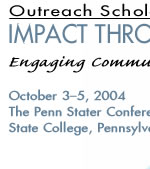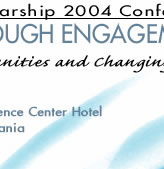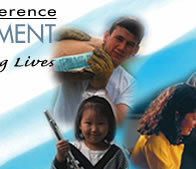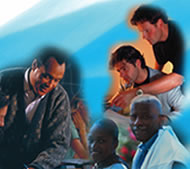Community
Connection: Using a Web-Based Volunteer Matching System
to Build Collaboration, Create Structures to Support
Outreach, and Track Student Service in the Community
Christine
S. Murakami, Assistant Director, P-12 Project, Ohio
State University
Susan Brooks, Program Director, Service Learning
Initiative, Ohio State University
Jennifer Bossard, Coordinator of Community Service
and Leadership, Ohio State University
Community Connection is a Web-based volunteer matching
and management system. What began as a small Ohio State
University collaboration expanded to include the broader
community, the Columbus School District, and five higher
education institutions in Central Ohio. Presenters will
feature the tool and its role in building and maintaining
multi-institutional collaborations.
Preparing Tomorrow's Students: A Small University with
a Big Investment in K-12 Education
Katheryn K. Fouche, Executive Director
of the Centers of Excellence, Columbus State University
John Lester, Director of Public Relations, Columbus
State University
With
a student population of only 7,000, Columbus State University
in Columbus, Georgia, houses seven dynamic outreach
centers. The centers provide critical support to inservice
and preservice teachers and K-12 students in Central
West Georgia. Administrators are challenged to increase
collaborations among the university's colleges, individual
faculty members, and students.
Engagement Kicked Up a Notch: A Five-County Latino Needs
Assessment
Kathleen
A. Hetzel, Family Living Educator, University of
Wisconsin-Extension
Paula B. (P.B.) Poorman, Associate Professor,
University of Wisconsin-Whitewater
Randy Thompson, Dairy and Livestock Agent, University
of Wisconsin-Extension
Shelby J. Maier, Family Living Educator, University
of Wisconsin-Extension
Lesly Scott, Nutrition Education Program Coordinator,
University of Wisconsin-Extension
Since its inception, The Wisconsin Idea has promoted
integration of faculty research with community needs.
Generally, flow of information moved from technical
researchers to extension educators to community programs.
Presenters share strategies for engaging as co-constructors
of an innovative five-county Latino needs assessment
utilizing focus groups with key stakeholders.
The Continuing Evolution of a Mature Stakeholder-Driven
Outreach and Engagement Partnership that Impacts Manufacturing
Productivity and Continues to Grow in a Competitive
Economic Environment
Nancy K. Lahmers, Administrative Director
Center for Excellence in Manufacturing Management, Ohio State University
Peter T. Ward, Associate Professor and CEMM Director
of Research and Communications, Ohio State University
The
Center for Excellence in Manufacturing Management at
Fisher College of Business has offered outreach and
engagement partnerships between educators, manufacturers,
and students since 1992. Mature organizations must develop
strategies to continually evaluate the effectiveness
of programs and to collaborate with stakeholders to
create value for the future.
Education and a Sense of Place: Partnership in Teacher
Education
Efrat F. Levy, Assistant Professor, Empire
State College
In
discussing a new Master of Arts in Teaching Program
aimed at placing adult career changers in underserved
urban schools, the partnership between schools and Empire
State College will be integrated with discussion of
a theoretical model that considers how to create significant
and meaningful attachments to local living places.
What Do They Say? The Impact of Engagement as Perceived
by Community Partners
Lorilee
R. Sandmann, Co-Director, National Clearinghouse
for the Scholarship of Engagement Association, University
of Georgia
David J. Weerts, Research Associate and Project
Director Wisconsin Center for the Advancement, University
of Wisconsin-Madison
Drawing
on case studies of twelve university-community partnerships,
this presentation focuses on how community partners
articulate the opportunities and challenges of collaborating
with universities. Most importantly, this session explores
how institutions might use this data to be more responsive
to community needs and strengthen the impact of university
outreach programs.
From
Architects to Privy Carpenters--The Down Side of Engaged
Scholarship
George
R. McDowell, Professor, Virginia Tech
Engaged
scholarship has the potential for great power, including
political power. But power corrupts. Engaged scholarship
runs the danger of being held hostage by client/partners
and scholarly objectivity lost. The case in agriculture
is instructive.
Using Grants to Achieve High Impact
Karen Bruns, Leader, OSU Extension and University Outreach,
Ohio State University
Kristine
Campbell, Assistant Chancellor, Public Engagement
and Institutional Relations, University of Illinois
Julie Ellison, Director of Imagining America,
University of Michigan
Many
institutions have used seed grants to foster and build
university engagement. The effect these grants have
on achieving quality and sustaining impact is dependent
on how the programs are strategically and systematically
developed. Does the university community perceive the
grants differently if they originate from different
units (academic, research, or outreach)? How does shaping
the granting process shape the perceptions about the
seed grants program? This session will focus on discussing
key questions related to developing and implementing
the appropriate systems and evaluations for maximizing
the long-term impact of grants programs.
Bringing
Humanities Scholarship Online: New Approaches to Scholarly
Communication in the Digital Age
Nancy L. Eaton, Dean of University Libraries,
Penn State
Joseph J. Branin, Director of Libraries, Ohio State University
Kenneth L. Frazier, Director of the General Library
System, University of Wisconsin-Madison
William G. Potter, University Librarian and Associate
Provost, The University of Georgia (invited)
Clifford A. Lynch, Executive Director, Coalition
for Networked Information and member of the National
Digital Preservation Strategy Advisory Board of the
Library of Congress
Faculty
research in the humanities has traditionally been communicated
via the book, but several factors have contributed to
a crisis in scholarly publishing that has upended the
old, print-based model. This panel will explore how
emerging technologies are changing the landscape of
scholarly communication.
Practicing
Public Scholarship
Jeffrey
Parker, Associate Professor of Psychology,
Penn State
Lakshman Yapa, Professor of Geography, Penn State
Barbara Bird, Associate Professor of Communications,
Penn State
David Riley, Associate Professor of
Architectural Engineering, Penn State
Faculty
from Penn State's Public Scholarship Associates, joined
by community members, will share their experience regarding
the development of the new intercollege minor in civic
and community engagement, as well as best practices
learned in Penn State's efforts to recognize the integration
of scholarship, contributions to the community, and
students' learning of democratic principles through
active engagement.
Building
a Collaborative for Outreach: University of Georgia
Poverty Initiative
Joseph Whorton, Director of the Poverty
Initiative, Office of the Vice President for Public
Service and Outreach, The University of Georgia
Matthew L. Bishop, Associate Director of the
Georgia Rural Development Council
In 2003 the University of Georgia completed a comprehensive
analysis of persistent poverty in the rural South and
its implications for the South's future development.
The study found that the South is the poorest region
in the nation, with 242 counties experiencing persistent
poverty over the last three decades. As a result of
the study, the University of Georgia is implementing
a Poverty Initiative, with the goal of developing comprehensive
strategies that will bring an end to the cycle of persistent
poverty once and for all. This session will provide
an overview of those strategies and further insight
into the findings of the study.
Development
of Statewide Extension Program Development Teams
Paul Becker, Senior Associate Director, Extension and Public Service, West Virginia University
Debbie McDonald, West Virginia University Extension Service 4-H Youth Development, West Virginia University
This participatory workshop will present
the WVUES experience in developing and implementing
statewide program development teams. WVUES will outline the
environment, functions, planning, and implementation of statewide
program development teams. Participants will contribute
experiences in team-based program development, and presenters
will lead an assessment of various team-based program development
models.
|





